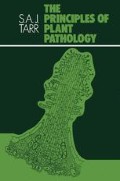Abstract
When a pathogen has successfully established itself in host tissue its subsequent spread is influenced by many factors including its aggressiveness, susceptibility of the tissue, and environmental conditions. For example, the lesions caused by a pathogen may be smaller, develop more slowly and produce fewer spores in a resistant than a susceptible plant. Some viruses become systemic in certain species of hosts but remain localized in others, and temperature may affect this. The spread of some leaf pathogens is limited by veinlets, resulting in typically angular lesions, or by anatomical or chemical barriers developed by the host as a response to infection (defensive reactions).
Preview
Unable to display preview. Download preview PDF.
Author information
Authors and Affiliations
Copyright information
© 1972 S. A. J. Tarr
About this chapter
Cite this chapter
Tarr, S.A.J. (1972). The colonization of the infected plant. In: Principles of Plant Pathology. Palgrave, London. https://doi.org/10.1007/978-1-349-00355-6_11
Download citation
DOI: https://doi.org/10.1007/978-1-349-00355-6_11
Publisher Name: Palgrave, London
Print ISBN: 978-1-349-00357-0
Online ISBN: 978-1-349-00355-6
eBook Packages: Biomedical and Life SciencesBiomedical and Life Sciences (R0)

